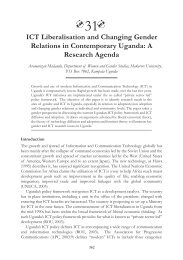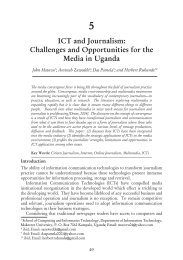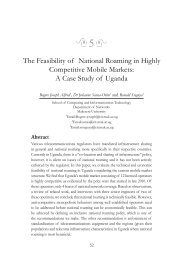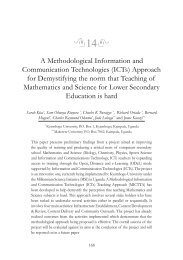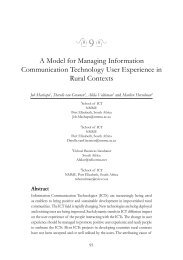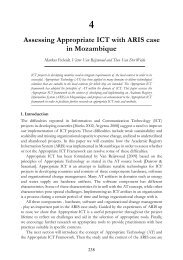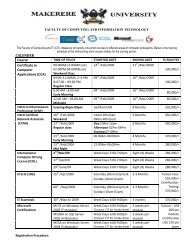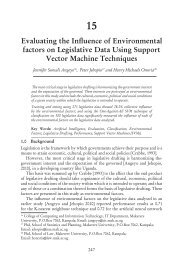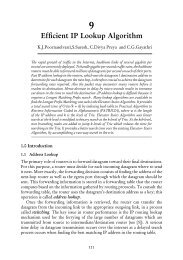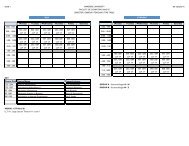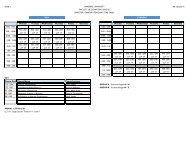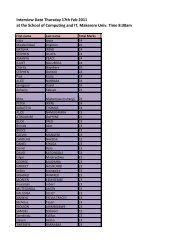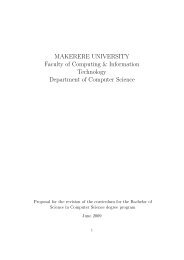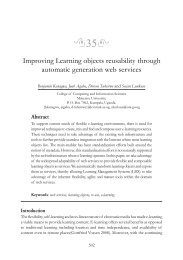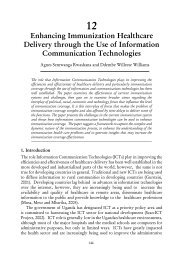Undergraduate Handbook - School of Computing and Informatics ...
Undergraduate Handbook - School of Computing and Informatics ...
Undergraduate Handbook - School of Computing and Informatics ...
You also want an ePaper? Increase the reach of your titles
YUMPU automatically turns print PDFs into web optimized ePapers that Google loves.
CSC 3112 Principles <strong>of</strong> Programming Languages 3 45 -- -- 45<br />
CSC 3117 Emerging Trends in Computer Science 4 15 90 -- 60<br />
2 Electives<br />
CSC 3110 Database Management Systems II 3 45 -- -- 45<br />
BIS 3100 Modeling <strong>and</strong> Simulation 4 45 -- 30 60<br />
CSC 3105 Computer Graphics 3 30 -- 30 45<br />
CSC 3114 Selected Topics in Computer Science 3 45 -- -- 45<br />
CSC 3115 Advanced Programming 3 30 -- 30 45<br />
Semester 6<br />
BIT 3204 Enterprise Network Management 4 45 -- 30 60<br />
CSC 3205 Compiler Design 3 45 -- -- 45<br />
CSC 3206 Group Project 5 -- 135 -- 60<br />
2 Electives<br />
CSC 3207 Computer Security 3 45 -- -- 45<br />
BIT 3200 Business Intelligence & Data Warehousing 4 45 30 -- 60<br />
BSE 3202 Distributed Systems Development 4 45 30 -- 60<br />
6.2.3 Course Unit Description<br />
CSC 1100: Computer Literacy (4 CU)<br />
Course Description: In this course, students are to learn about the basic organization, concepts <strong>and</strong> terminologies in<br />
a computerized environment. They are also to get an in depth underst<strong>and</strong>ing <strong>of</strong> common computer applications. The<br />
use <strong>of</strong> related applications in different operating systems will be explored. The aims <strong>of</strong> the course unit are to: Equip<br />
students with basic knowledge about computer organization; Equip students with skills <strong>of</strong> using common <strong>of</strong>fice<br />
applications; Expose students to different operating systems; Equip students with skills <strong>of</strong> how to use the Internet;<br />
<strong>and</strong> equip students with knowledge about common text editors in different operating systems. On completion <strong>of</strong> this<br />
course unit, the students will be able to: Describe the different parts <strong>of</strong> a computer; describe the historical evolution<br />
<strong>of</strong> computers; competently use the common <strong>of</strong>fice applications in at least two operating systems <strong>and</strong> competently<br />
use common text editor in at least two operating systems.<br />
Indicative Content: General computer organisation; Historical perspectives <strong>of</strong> computing; common Micros<strong>of</strong>t<br />
<strong>of</strong>fice packages; <strong>of</strong>fice packages in other operating systems; text editors; Common Linux <strong>and</strong> Using the web.<br />
Reference Books:<br />
i. J. Preston, R. Ferret <strong>and</strong> S. Gaskin, Computer Literacy, 2007.<br />
ii. J. Janrich <strong>and</strong> D. Oja, Practical Computer Literacy, 2001.<br />
CSK 1101 Communication Skills (4 CU)<br />
Course Description: This course provides students with skills <strong>of</strong> effective communication. These include verbal,<br />
written, <strong>and</strong> gesture. The course aims at facilitating students appropriately <strong>and</strong> clearly communicate with others. The<br />
aims <strong>of</strong> the course unit are to: Improve the communication competencies <strong>of</strong> the student; Improve problem solving<br />
strategies <strong>of</strong> students; improve the art <strong>of</strong> critical thinking within the student; improve the student’s ability to collect<br />
<strong>and</strong> synthesize information; provide students with knowledge to utilize the library <strong>and</strong> other educational resources.<br />
Indicative Content:<br />
• Writing Skills: Thinking critically/selectively before the writing process; selecting the relevant details;<br />
organizing the relevant details logically; writing the reports essays, letters <strong>and</strong> taking notes in appropriate<br />
register; avoiding ambiguities, fallacies, irrationalities; providing supportive evidence; editing documents,<br />
pro<strong>of</strong> reading; writing <strong>and</strong> exp<strong>and</strong>ing information; Quoting <strong>and</strong> citing references; writing a curriculum<br />
vitae.<br />
27



